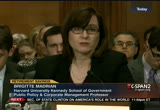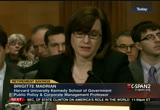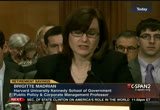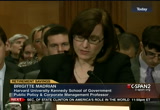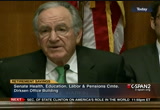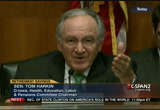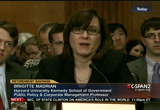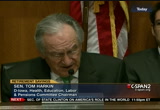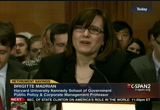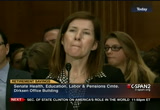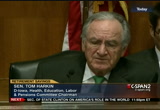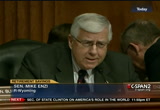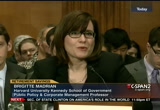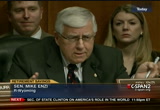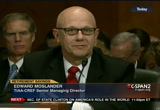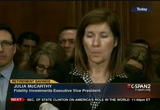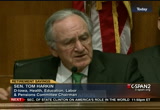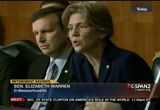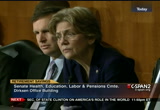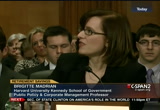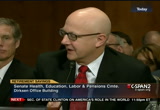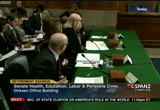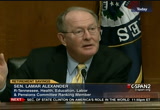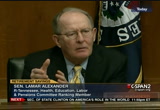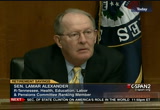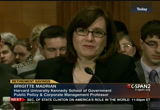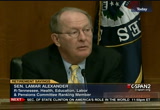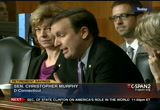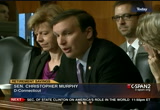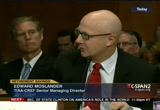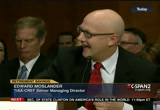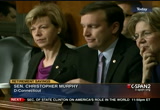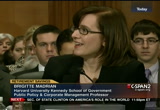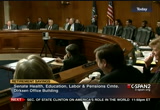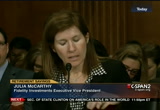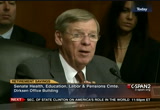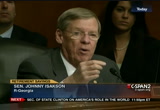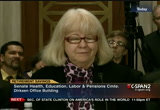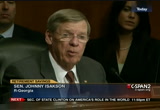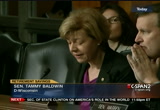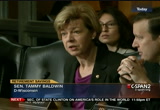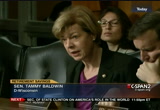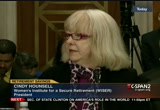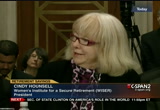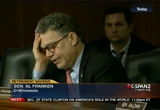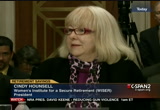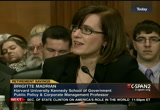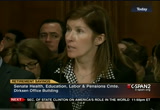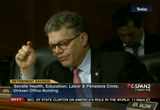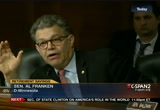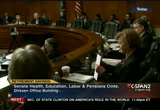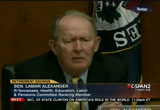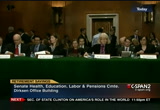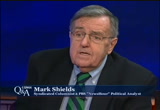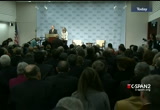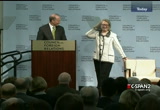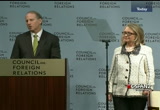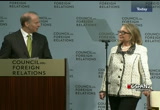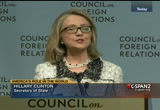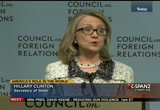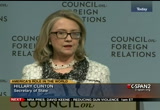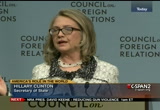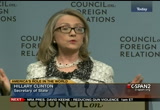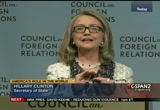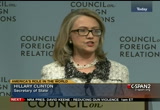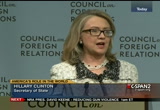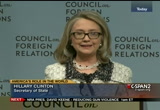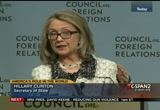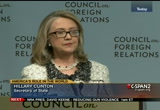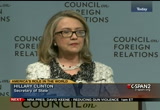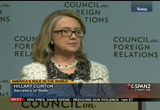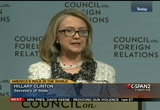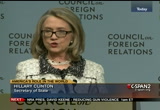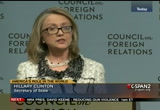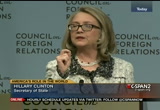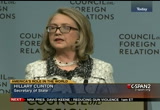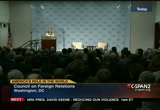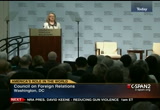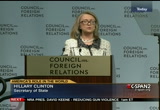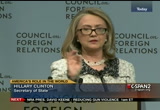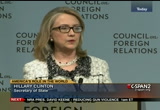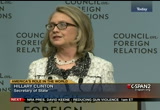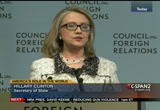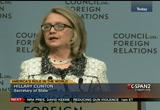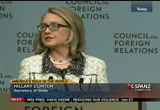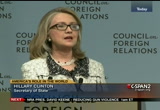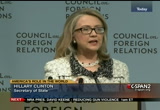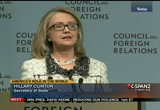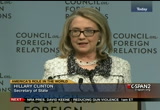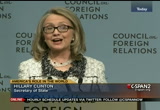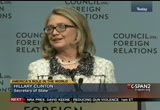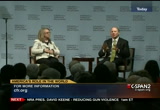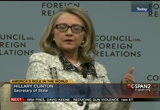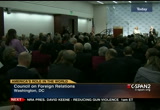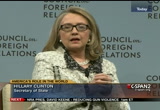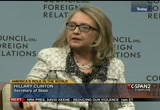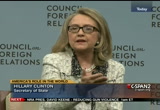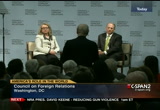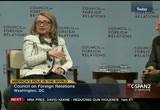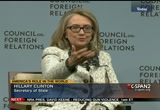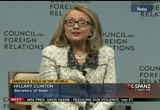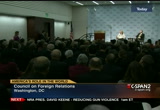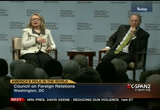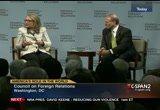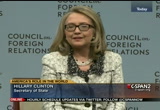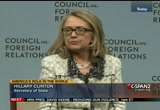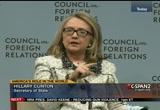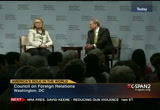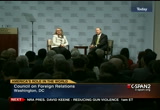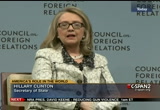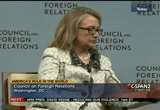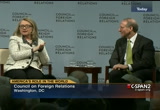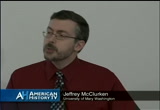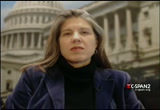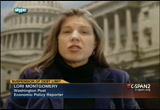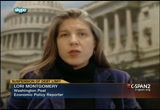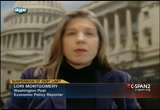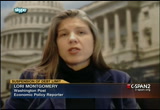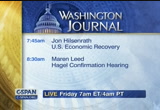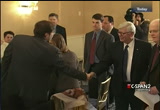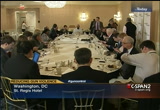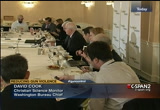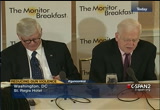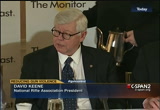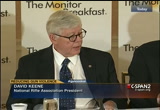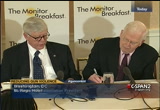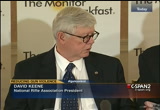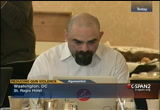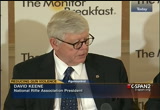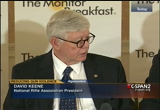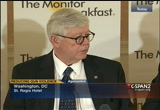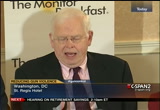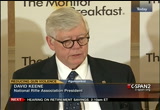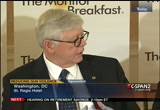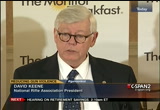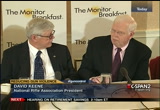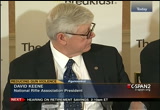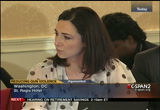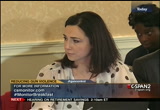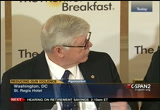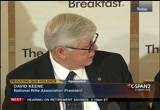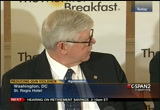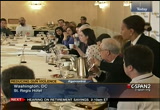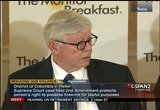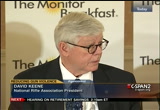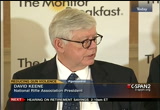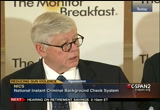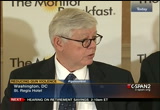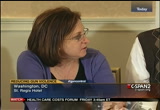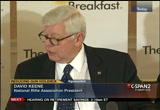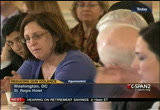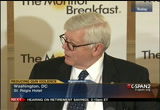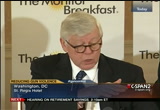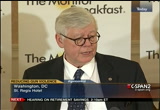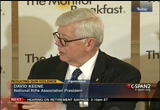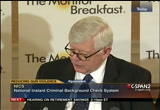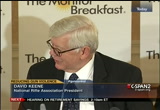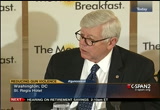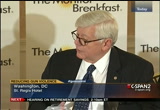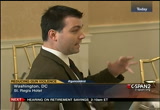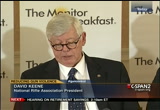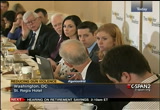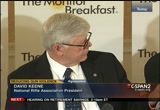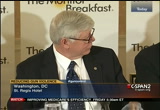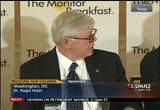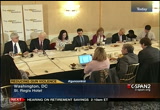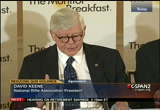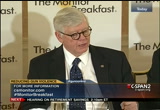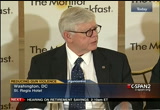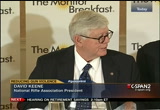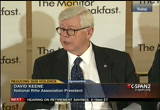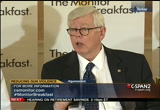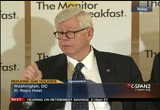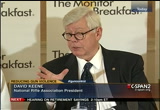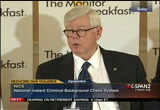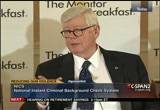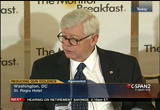tv Capital News Today CSPAN January 31, 2013 11:00pm-2:00am EST
11:00 pm
contribution may well encourage more employees to opt-out of saving plan participation altogether. i found a few employees the jack to default contribution rates of 5% or 6% of companies that match that level. even though the pension protection act increased a sign cause for a 1% increase in contribution rates each year, there's no reason employers cannot escalate rates more quickly come to see 2% 3% a year. researchers who employees outside of contributions with mark rested and no increases. the employee contributions are not mutually exclusive and a combination of these approaches could be particularly powerful. the current system is leakage. many teeth out of their comfy for retirement further purposes.
11:01 pm
this is a serious problem and one largely under the radar screen. recent studies by the gao common pleas of the federal reserve and by the private company i'll estimate there is a sizable amount of leakage from retirement savings, most significantly to cash distributions to change jobs. moreover, fidelity investments in the boston research group provided 55% of a preretirement distribution from their defined contribution savings plan later regret having done so. the reality is plans to sell avery fund retirement. they serve as a savings vehicle appeared because of this the recommended contribution rate to these accounts should reflect not only what is needed to successfully from retirement but what will unlikely to reach on before retirement is slow. this suggests policy should encourage rates about as neat as
11:02 pm
the leeches on retirement or policy should limit the extent to which individuals can take her retirement distributions from these accounts. a shortcoming of the system is most employer savings plans do not offer employees and easy way into retirement income to remilitarization option. if retirees want annuitize income stream about social security, they let to contend with the private market on their own trying to evaluate a product they have little experience in a substantial wealth. the rates are low and several viable services to employees that comes to the investment option and a savings plan. they evaluate the alternatives and select options to their players names are able to offer employees lower cost investment
11:03 pm
option and employees have access to individually to economies of scale. retirement income options would be current and former employees that have little incentive to do so. our defined contribution system is not perfect, but there's other things to make it substantively better. in conclusion we can increase coverage by creating a low-cost mechanism for small employers can benefit from the east of payroll deduction to fund a retirement savings account. we can encourage employers and ways for higher employer contribution rates. third, we can limit plant them for three can encourage the adoption of annuity options. thank you. >> thank you, dr. madrian. ask around the five-minute questions. i want you to know we are looking at the leakage problem
11:04 pm
and something i've become more aware of and hopefully this committee will be looking at the shortly. let me ask you -- share this retirement plan, a key open issue is that the contribution rate should be. those who have been working on developing this plan have thought about it not for social security between employer to give you contribution was some low threshold employer match and allowing an employer to raise that match if they want to us in employment incentives so it might provide one and a half%.
11:05 pm
so you could answer it as an employment incentives. have you thought about if we move ahead in this area, what should the contribution rate be. >> that's an excellent question i encourage the committee to think not in terms of a single default contribution rate, but a differentiated alternative. and senator alexander was talking about the small restaurant chain, my guess is employees are younger and for a ban in our contribution rate might make sense. whereas a look at someone who's a bit older and this is their full-time job, the default
11:06 pm
contribution rate might be substantially higher. we know from investor psychology that individuals think in terms of raw numbers, multiple sub type, 5% of pay, 10% of pay. desired benchmarks that individuals can get their hands around and might be worth taking about something mahler. 5% for younger workers to something higher, maybe 10% for lower workers. >> were trying to make this as simple as possible. >> and a big fan of simplicity. >> all just ask everyone else here. we sometimes hear the argument that automatic enrollment doesn't be savings because people make up for income by reducing other forms of saving. have any of you looked at whether automatic enrollment president of the savings? >> i've been trying to do a
11:07 pm
study to answer this question for years and it's hard to get data to do that well. the little evidence we had suggested the extent there is cried out, it probably isn't that they. i have a former graduate student who's done research on the men's behavior by members of the military and a savings plan and he finds financial education program substantially increased savings in the tsp have had no or sunpak, for example, on the amount of credit for military members have outstanding. so re-signing of crowd out there. the society by my colleague at harvard looking at denmark are much better data and they are so concerned about privacy. when they look at automatic savings programs, they found little cutout and other parts of the balance sheet either. so i think it's a legitimate
11:08 pm
concern, though most of the evidence suggests certainly it's not one-for-one offset. >> any other thoughts on the crowd out at all ms. mccarthy? >> i would offer we don't have it. the complexity it would affect the asset the pain is difficult. it's important on the automatic enrollment is a significant impact in getting participants into the plan. our enrollment rate, participation rate is 67% previous automatic enrollment 80%. it's a very powerful distinction in and of itself is so dramatic that it's hard for me to think is creating a big distraction with vehicles. >> before my time runs out, a lot of people don't have 40 hour week jobs. caregivers. what do we do to make sure
11:09 pm
people with nontraditional employment arrangements had easy access to retirement plan? >> whinnied options and opportunities at work. part-time workers are just not eligible for benefits and it's been true. i don't know that's ever going to change. i don't think requiring employers to do that all the ways you can fudge those rules. i just think we need ways to save and we don't have that. perhaps the workforce. >> again, that's something we're looking at in developing this issue to make a simple comment make it easy so son a burden for part-time employees or employees that come in and out of the system all the time. it would not have a fiduciary response ability and operate a
11:10 pm
plan. any other advice you have, please let us know. >> we look forward to seeing the plan. >> mr. chairman, said senator enzi has been working with this, that to the first question. >> thank you, mr. chairman and thank you for working on this. your testimony is just packed with ideas and that's led to questions, which are in more technical in then i'll attempt while doing my questions. i appreciate the emphasis on hondo enrollment versus perhaps admin they and i appreciate the comments about schools needing to do financial literacy. i looked a number of schools to see what they're doing and i'm very disturbed and they provide them with the money that they're going to learn to budget, daily
11:11 pm
about the fact that their social security and medicare are taken out and the possibility of saving they might add to that. i'm hoping that will change. dr. madrian and mr. mccarthy, have you done any plans to boost the 401(k) versus a boss? would that make a difference in that autoenrollment in contribution? >> the limited research on regular versus matt savings account suggests people behave similarly in both types of saving plans, which suggest the roth option might lead to higher levels of wealth accumulation because the taxes have been taken out of the front end.
11:12 pm
truthfully we need much by research to the question. >> i would agree with that. senator enzi, we haven't done extensive research. we see powerful resource with the roth ira and the roth plan for incremental savings coupled with audio. i don't have distinctive research at this point. >> i hope we stay in effect with possibilities. what is the amount of regulation and the possibility for liability. that's it to think small businessman tony to keep them from going into this. i used to do the accounting primarily for fire when k. and do fairness testing. packets into other top executives are getting paid more in saving more versus the other people. do you have anything hessians
11:13 pm
for ways the regulation could be made simpler perhaps for small business? mr. moslander come you are dating to that. >> sure they regulation is the typical name, especially when fiduciary response ability. one of them are created and unintended positive consequences can put it elsewhere. it might be the portability possibilities difficult today to change jobs, but the fiduciary responsibility and some hotties that unless they are in the employer. we go a long way towards simplifying the ability of employers to provide for the plants and also simplifying portability by participating rather than cashing out benefit
11:14 pm
where they terminate employment easier for benefits to be portable. >> anybody else want to comment on the regulation? >> packages that come the simplification is key in every aspect of this conversation for a regulatory or, our experience shows the caller plans, their adoption is very often avoided as a result of regulatory requirements. looking at safe harbors in the fiduciary responsibilities, the disclosures are often onerous address cost for the employer, which will cause them to have the very real opportunity there. without walking away from the importance of goals to achieve with the regulations. >> anybody else? i've also got a bill that would allow pooling for small businesses.
11:15 pm
it's still individual accounts and that's what allows portability for a different job, which improves enhancement of this. sender: i have a deal with some of the leakage problems so people have an opportunity to put it in with one business. my time is expired and i think the chair. >> thank you very much, senator enzi. senator enzi was chair this committee and shepherded through the pension protection act. he is one of our resident experts on this whole issue. i'm delighted to have them as a partner in this effort. as you know, we recognize people in order of appearance here, so this will be senator warren and senator alexander. senator isakson, senator burr,
11:16 pm
senator frank income ascender kacey. >> thank you very much, mr. chairman. i want to offer my thanks to the panel very much for the work you're doing in education, for all of you, the commitment made to educate clients and the work you've done in research. she seems to me, and a major testimony. i agree senator enzi is held at ideas, good thoughts and primarily based around how we might do better with employer-sponsored plans. this polling people and. i went through the notion of changing opt-out, increasing the default amount to gross and you're very creative plan, dr. madrian the changing how the employer calculates the incentive to get people to stand. but i also noticed in your testimony to you all, to one
11:17 pm
extent or another, talk about incentivizing the employers are encouraging employers. and i am mindful of some alexander's point that i'm the one hand, we can require the employers to participate. senator alexander said this creates complications for small businesses. so the question i have is can you fill in that part of what you're talking about in your testimony? we don't have employees who will participate in the science of a don't have employers offering this plan. so how do we get more employers to offer these plans? what are the options available and how effective will that be? ms. mccarthy, which like to start? >> s. commit thank you. it comes down to the discussion because the four smaller employers is the cost of administration in the fiduciary
11:18 pm
responsibility and complexity that goes along with administering plans. if we can streamline some requirements and accountability, we would naturally better adoption dominica into the experience, the space to offer simple plans to reduce the administrative cost as well. >> then they completely agree with that. there needs to be a very simple option for employers that needs to have no great military requirements, very minimal regulatory requirements, ltd. fiduciary responsibility to do something simple and straight outward and to the extent you can piggyback that the something else employers are doing so doesn't add an administrative burden but also how. for example, a small employers are filing tax payments on behalf of employees quarterly,
11:19 pm
couple the contributions to the saving plan with what they're already doing to pay their quarterly taxes instead of instituting a new regulatory requirement that they need to do his contributions and some other way, shape or form at some other point in time. anything to minimize administrative or in regulatory burden will be extremely helpful. you can also think about providing a modest tax incentives to companies that they offer savings plans. if you offer savings plan, we give your breakout employer taxes. >> i would agree with everything purchased that. out of the pension protection act, additional requirements are probably very good things. we have so i have free disclosure, which is valuable at the participant manuel family
11:20 pm
spent time and energy to mail out fee disclosure information to participants that are minimally engaged in the plan and are not going to be interested in the expense ratio offered under that plan. that was the regulation well intended, but didn't have all the impact it was designed to have. trying to manage necessary regulation with regulation that's not going to have a bacon pact, just echoing that important part. >> is this going to get us there that make in the plain simpler? >> i think so. do make say difference for people. very valuable, thank you very much. >> i would like to continue,
11:21 pm
professor warren, senator warren find of questioning because that's very helpful. i remember in order to be the governor of tennessee, walked across the state many years ago and there's no one to talk to do, the cows are along the road. i was thinking if i got elected, would if i could make a tax form for some sort of list that i could hand to somebody who wants to start a business and safe from the state's point of view, this is everything we care about. these are all the taxes on the regulation, complete us. if you do all these things come you don't have to worry about us, the state anymore. when i got into office, i never was able to do that. but still, simplicity is pretty big here. we've seen a think that the law passed a few years ago has
11:22 pm
taught us in games about the value of the default position about autoenrollment, automatic escalation henry no financial literacy is not a high level among a lot of of us, even if we spend a lot of time, these things can get confusing. we don't want to take anyone's freedom away to make his or her own decision about this. automatic enrollment, or automatic changes are default position said that her reflect the reality of an individual may be one promising further separate to take a new senior advice about what they should be as once said. it was this simple form because that's what i'm thinking. i wonder what happened if i invited to to write a fluorescent admitted to us. let's say you're about to go into business.
11:23 pm
dr. madrian compasses that she what you do. he studied the status and you know what's going on today than we do. why don't you write for us a simple plan we could put into the sofa and starting a business or have a small businessman marty small businessman marty pei mei fica tax and got the minimum wage and i'm worried about the health care law comes somebody says to me, what you do something about retirement? i'm going to say i might not make any money this year. but if it's so simple that i could do it and it's good for my employees and good to do, maybe we could do that. and we could make it a pilot program. we don't have to do it for everybody in the whole country at once. so i would invite each of you, if you would like to come this to submit to meet our us your idea of a simple plan, free of anything you can think of and still make a responsibility that would encourage an enterprise to
11:24 pm
start or offer a voluntary plan that would promote savings levels you think are appropriate. i'd like to ask one question. would you do it for any business clinics in the judo for a small business kites and if so, how would you define the enterprise he would do such a thing for? anyone have a response? been that i'll start by saying i'm going to go back to my class next monday and i'm going to give them your challenge will see what they come up with. >> i'm quite serious. >> are likely to come up with excellent ideas. >> give them the idea that you're going into business in the credit for things to do. how would she do this? >> last year, the cfp be called some sort of a competition. to redesign the mortgage disclosure form and list the
11:25 pm
great thinkers in society. >> at the consumer financial protection bureau would do that, it would double -- it would increase my appreciation of the agency, which is not very high right now. but the mortgage disclosure form is a good example. we don't want to do something bad to somebody. when a pileup in your down here getting a loan, anybody's got a mortgage loan is absurd. nobody reads it. nobody can read it or understand it. you're less disclosure because of more regulation. rather than complain, let's start from scratch and see what could we do? let's follow up senator warren's comments in mind and that of others here. all of you think simplicity mix of a different and i'm sure that's true.
11:26 pm
any comments on any of that? >> thank you for the opportunity. we look forward to it. we have a lot of good ideas to bring them forth. >> thank you very much, senator alexander. and now senator murphy. >> thank you, mr. chairman. one important hearing. just one quick thought. to my mind, the most important barrier to save games is not simplicity of regulations, is stagnant wages. the average workers make 4% less in real wages than in 1870 since 2005. all costs going up come the health care went 8% of your budget to 18% of your budget in the last four years. it's tough even if you don't make more than you did 10 or 20 years ago. i know an adequate attack of that in the context of april and
11:27 pm
pensions, but it's worth noting if congress doesn't tackle the issue of stagnant wages, there's not a lot we can do around the edges to try to make money appear out of nowhere. that being said, younger generations today still think they are living in their parents world. i mean, they still think if they go to work that they're going to end up getting taken care of. they probably relate to much of medicare and social security, but they also don't understand how much obligation has shifted to them. mr. moslander, a strategy that up the income disclosure act and this is a bill senator isakson. this session and reintroducing it. i just want to ask you to follow up on your support for that piece of legislation. this is an innovative idea to put right in front of workers, especially younger workers about the true annuity benefit of
11:28 pm
their savings is. i guess i'll ask a double-sided tape question of a bill that i support. given these forms come to your thoughts of information already been a lot of workers don't pay too much attention in the first place, what do we think the confidences added another number, a pretty startling number of the amount of money you get if you continue in their current savings project to read. what kind of confidence do we have that might change people's savings patterns? >> a couple things. i'm not sure young people are as confident that they're going to be taken care of. there is skepticism among young people about viability and that they would be in social security by the time they get older. i think there's some research dishes younger people are a little bit more inclined to consider saving for retirement.
11:29 pm
at tiaa-cref, even before there were quarterly requirements, we send people a projection come a statement at the end of the street have projected their income in the western important that the edit every year. it was important that they got it every year and over time, we believed presenting them with adding comfy chair as opposed to just a nation figure a mindset towards lifetime retirement income security and is one of the reasons we believe we see mark annuitization nec and the prophet make inspector. part of its products, but also we presented this and the employers have ramped first the fact that the plan is for retirement income investors are reinforcing mechanism is a mindset issue, more -- it does
11:30 pm
11:31 pm
to much that people don't want to save but they don't know how to do it and it's a combination of a lot of people don't have high levels of financial literacy. you know they are not comfortable with choosing harvard university up until a until a year and a half ago had 259 different investment options. that is a lot of choices to sort through to try to decide how to invest your money. and i think that is the key reason why automatic enrollment is so successful. automatic enrollment is the extreme form of limitation. you don't have to do anything if you want to be saving and in fact the action needs to be taken by individuals who don't want to say. they're the ones who can opt out of the plan and the fact that when opt out happens it happens immediately. it's not like people discover a year later my employers taking money out of my paycheck and i didn't want that to happen.
11:32 pm
i want to opt out. that to me is indicative of kind of a strong desire for most people to save and the simplification is really key even implants without automatic enrollment. we have found that if you provide a simplified option to sign up for the plan, think of the postcards that have the box on them to enroll in a savings plan and you pick an investment allocation for you. even initiatives like that could substantially increase savings plans so i think the simplification is the key for both the employee and the employer. >> thank you. >> senator alexandra i want to memorialize you publicly in front of everybody including those on television and senator murphy i'm delighted to accept his replacement and the lead co-sponsor looking forward to it i appreciate the plug very much and i appreciate the comments of
11:33 pm
ms. moslander regarding the drawdown. we are always talking about the cam elation phase phase of getting the process for taking the money out the wrong way can lead people without any retirement while they are still alive and i think it's very important to focus on that education. ms. mccarthmccarth y and want to ask you question. i think you said near testimony that -- have better outcomes. is that correct? >> absolutely correct. >> the department of labor over the last two years and i understand continuing this year has tried very much to change the definition of the term fiduciary. would you give me her opinion on if that change takes place what effect that would have on people getting an education in terms of retirement savings? >> thank you for the opportuniopportuni ty to talk about it. i fear would have a very dramatic effect on sponsors or partner vendors to provide guidance to participaparticipa nts. we have done a tremendous amount of research amongst the
11:34 pm
participants we served and enrolling in in the plan and out of growing a plant in one of the key dynamics is to get simplicity as we have been talking about. but simply not knowing what to do and when i think about guidance, guidance boils down to help. it's as simple as that so the prospect of not allowing providers to help participants engage in their plan will i have confidence have a dramatic impact on the issue we are talking about today and it won't be advantageous. >> appreciate your testimony very much and i feel exactly the same way. i think education transparency is invaluablinvaluabl e in people making the right decision for themselves and every time we put a barrier between them getting that information, we are causing bad things to happen. that is not the intent but that is the result. that brings me to ms. hounsell's commentary especially about second career women and divorce
11:35 pm
and things of that nature. i ran a company for 22 years where all my workers are all my salespeople were independent contractors. i had a thousand of them in almost all of them were second career women, divorced women or women over 50 years old he came back to have a career in real estate are to some life driven necessity. most of them had not saved or they did not have a husband who had saved or were not prepared for retirement which would be 10 to 15 years. but because i use independent contractors as salespeople in my organization, the irs -- against me providing information or help in savings made it impossible for me to help them which brings me to the point of the fiduciary and everything else. we probably need a one-page list of all the things we do up here that are negative towards people starting their retirement savings either in the tax code and iras rules and regulations
11:36 pm
are with the department of labor might do. those are not the intended consequences but they are the consequences. they were with me. the independent contractor used to be a template test one of which was you could not provide information vehicles or anything else. you could direct them to an i.r.a. set and someone also to be the administrator or a pfizer. could you do that for us with the people you deal with, the trials and tribulations you have with people having access to that? would you give us a list of all those things that require that in the end are negative towards the formation of capital for savings retirement? [inaudible] >> i know that but you are very experienced with exactly the type of people we are concerned about. >> i did it again. sorry. i think what you are saying is that you actually directed people toward some kind of your retirement plan.
11:37 pm
but you weren't supposed to. >> no, i didn't know. >> you didn't know. [laughter] >> i could not direct them to to a plan. ike advised that they have to seek information but i couldn't give them the direction or anything else. i would tell them you ought to take care of this. >> that is often what helps people get retirement income because somebody will direct them to what they should be doing whether especially if they don't have auto enrollment. >> the reason i mention senator harkin made a statement about he called them nontraditional employees with the affordable care act. some of the other things that are happening there going to be more independent contractors as workers in this country i think an a more part-time workers in this country and it will be more and more difficult with some of the prohibitions in the law now and regulations and we have to get the right type of information. for all of these reasons. the senator from --
11:38 pm
>> thank you and i want to also thank the chairman and ranking member for holding this important hearing and our witnesses were testifying. i am deeply concerned about some of the statistics from my home state of wisconsin. the number of citizens who rely solely on social security as a source of income once they retire figures shared by aarp suggests a 20% of wisconsinites who receive social security have reported it's their only income and two out of three for wisconsinites age 65 or older reported that social security makes up more than half of their monthly income. so the figures are certainly troubling. i also appreciate my colleague senator murphy for talking about some of the issues that we are not grappling here with today,
11:39 pm
stagnant wages etc. as we look at the health of our middle-class. and i just think about the hallmarks of middle-class status in one of them in my mind is retiremenretiremen t security. and of course we are discussing the fact that is in jeopardy for some. i want to appreciate your testimony. this is the week in which we celebrate the fourth anniversary of the signing of the lilly ledbetter act into law, and we are hopeful that that act along with future legislation that we are working on will begin to decrease the wage gap that exists between men and women. but until that happens, obviously it is clear that women earn less and therefore that affects the capability of saving for retirement. a report by the joint economic committee released this week
11:40 pm
chaired by our colleague on the committee senator casey stays there for women over 65 years of age, social security accounts for two-thirds of their total income while for men over the age of 65 is roughly 64%. in your written testimony, you reference the importance of the national education and research center on women and retirement planning and educating women on how to plan for retirement. a program funded by the administration on aging. so one quick -- it's my understanding that if sequestration precedes the administration of beijing would see a decrease in its discretionary budget of about $121 million in 2013 alone. i wonder if you can discuss general the importance of this program in promoting and promoting retirement savings and whether you believe or have
11:41 pm
heard if the organization would have an impact on the initiative? >> yes, it will have an impact on all of the programs on the administration on aging in a lot of these broke dams are minimally funded but have such a big reach and the way we have actually operated at the center was to train trainers all over the country and we have worked with the wider opportunity for women and a number of people in wisconsin. wider opportunities just came out with a report last week. i don't know if you saw that. what it does it does is it sort of shows with people over 65 need to live on in various states and cities and i don't remember wisconsin but i know for single women it's anywhere from 19,000 to 29,000 that's just minimal, all of those things that are absolutely necessary.
11:42 pm
so i think everyone says -- i work with a lot of organizations and everyone will say well, that we need one-on-one especially for like the latino groups and we need one-on-one for everyone really. that is what everybody wants and you sort of know that from your research as well. i think what is really important is senior centers and places where people can actually come for help. finra has this great project on libraries and there are that many of them. i think there are 25 they funded. i've been to a number of them doing programs with them. they are incredible. so there ways that we could do this but there is no coordination, no reach nationally except through these little programs that the national council on aging does a great initiative as well. so i don't know what will happen
11:43 pm
after this administration. >> thank you. >> senator franken. >> thank you. this topic brings up so many -- so many subjects about what is happening to the workforce, what is happening -- to what kind of jobs before going to do and what kind of companies people are going to have in the future that you know, we are changing and people are going to have lots more different jobs as we go into the future. it's long past where you have the same job for your entire career. so that is an issue that i wonder about, and not only do people change jobs, companies exist for sometime shorter times
11:44 pm
and so what is the effect of that? what is the effect of people may be having 20 jobs in their career or 30 jobs in their career going from one thing to another? and what happens when the place where you have your pension goes out of business? anybody can speak to that. >> i mean i can speak to that for a minute because it happened to me. i have a frozen benefit at the ppc g.. i work for a company for 16 years and there went the tv plan at some point. it was frozen and then went to the pbgc. so what you do is people are going to have to call together many of these different benefits wherever they go. >> i imagine your benefit under the pension benefit guarantee corporation is going to be a lot
11:45 pm
less than you had expected. >> it was frozen for 25 years so a lot less. >> i think juliette can probably talk less about what happens from the administration standpoint. what i would like to point out is i think the fact that people are changing jobs so often really highlights the importance of getting employers to set hired to fall contribution rates and to address the problems. those are both issues that are really tied to job changing. think of the system where companies enroll you in at low contribution that escalates over time and you are changing jobs every year. you are arias getting restarted with a low contribution rate and you never get up to a high enough contribution rate to set aside money for retirement so that is the key reason why we need a higher default contribution rate with automatic enrollment and then we know a lot of the leakage that is
11:46 pm
generated when people change jobs and suddenly they are presented with this option to leave the money in the plan come cut to roll it over to another plan or i can take money out and do something with it today. that is when the leakage is occurring so we need to think about ways to discourage employers or discourage employees from doing that to the extent some of them may need money because they are unemployed to limit the extent to which they're taking they are taking money out the plan. really important. >> i just want to put a book marking my head here because that all goes to financial literacy. but go ahead. >> it absolutely does. everything bridget is saying comes back to financial literacy and education on the application of compounding. their number of different studies out there that talk about how long these next generation will stay in their roles ranging from 10 years to
11:47 pm
20 years which is very different than the environment that we have grown up in. the ability to take your benefit and consolidated and wrote together so if you start to think about retirement projections you really have a comprehensive idea but you became elated and continue to build on that. we have a study that shows age 20, participant age 20 to 24, 51% of them don't use the planet also there is a portion that isn't engaging. 44% of this population cash out. maybe they get to 4% and you cash them out and they get onto the next next company and they will never accumulate retirement wealth. >> thank you. i want to touch base on a couple of things. financial literacy on the health committee and the labor committee or the pension committee or the education
11:48 pm
committee, we need to have financial letters he in our schools. i forgot who assigned you -- senator enzi who gave you your big assignment? i would have another set of your students work on a math curriculum that uses all the issues in retirement to teach math but also teach financial literacy at the same time, because i remember we used to have shop and hoh and hoh is home economics. and so that is the place -- there is a place for us to teach, to have kids understand the world that they are going into so they don't get in trouble with credit cards, so they don't buy a house with a
11:49 pm
bad contract so it takes some of the pressure off of the pbgc. [laughter] and then the other thing i just want to mention is annuities. you know people, i was on the special committee on aging and something shocked me and in richer spec it's not shocking that people actually when asked how long do they think they are going to live underestimate. and so we need to give people into annuities. we need to do that so that they don't out live their savings. thank you. >> thanks senator franken. i want to thank the four witnesses. very very helpful. we would like to leave the record open for 10 days. senator harkin had to step outside and going to conclude the hearing that several of us
11:50 pm
may have followed questions that we may want to to ask you and if you would be kind enough to respond to them i think you can tell the level of interest in your comments that we will surely pay close attention. you have gotten to big assignments here from senator franken and i. this is encouraging to me because the legislation that passed in 2006 seems to have had some good effects and we have gotten some good information about ways to meet senator harkin's harkins goal which is to narrow the gap between what americans ought to be saving for retirement and what they do say for retirement. for my own point of view it seems to me a good deal more work needs to be done on complexity legalese and liability and that this is a committee where we supposedly have very different ideological views but i think we have heard some comments suggestion here
11:51 pm
that rather than taking off regulations and approaching it by taking off regulations come cut we might try a model that starts from scratch with the objective of making it easier for business enterprises in our changing country, where apparently more americans are going to be independent contractors and not full-time employees. may be part-time employees. how do we make it easier for employers of any kind to offer savings and to do it in a way that closes the gap that senator or can call this hearing about. i think you very much for coming and i look forward to hearing back from you and i suspect you will be hearing from several of us with requests. the hearing is adjourned. [inaudible conversations]
11:53 pm
>> john mccain's 2000 campaign when he ran for president as the most memorable campaign of any that i have ever covered or been around. i mean it was just -- we will never see it again and here he was facing george w. bush to head off of face cards of the republican party backing him in the three republican governors of new hampshire and all the money and john mccain
11:54 pm
went out and held 114 town meetings. he stayed there until every question was answered. you would see the lightbulbs going off on people's heads. when will we get the patients bill of rights and john mccain would say we will never get a patients bill of rights as long as my party is on by the insurance company and the democrats are on by the trial lawyers. and it was just this refreshing candor and you could see it in people's responses. he. he was totally open to the press there was a candor and an openness and a welcome this that no one had seen before and no si. now secretary of state hillary clinton on the u.s. role in the world. she was at the council on foreign relations today for an hour and will meet with
11:55 pm
president obama and the white house tomorrow her last day of secretary. her successors and it should john kerry opie at the state department monday for a welcoming ceremony. [applause] >> please take your seats. good afternoon and on behalf of bob rubin, carla hills who is with us today and the entire board of directors and the members i want to welcome you to the council on foreign
11:56 pm
relations. i'm richard haas president of the cfr. for those of you who don't know who we are we are an independent nonpartisan membership organization of think-tank and a publisher and we are dedicated to improving the understanding of the world of the foreign policy choices facing this country. today we are continuing what we have come to call secretary of state we cure the council. on tuesday night we were fortunate to hear from george shultz, who served as secretary of state for some six and a half years under president ronald reagan. and this afternoon we are honored to host hillary rodham clinton. during her last 24 hours as president obama's for secretary of state, immediately afterwards i'm told she might be expected to party like it's cartagena all over again. [laughter] we did our research and this is the eighth time that hillary clinton has spoken at the council and her third appearance
11:57 pm
in her current incarnation as secretary of state. and his afternoon speech is probably the most anticipated one she has given here and it may be the most anticipated farewell address since 1796. [laughter] i suspect though that her views on entangling alliances might be somewhat different than george washington's. much as been made of the mile she has put in as the country 67 secretary of state. you have seen a statistic. she has visited some 112 countries and logged nearly 1 million miles of travel and they 87 days of flight time. but more important than that adam secretary is what you have put into this. in your your tenure as can't say with some of the most consequential events and decisions of this young century. the balancing of american foreign policy toward aisha, winding down the war and iraq and after the surge in afghanistan, the typical
11:58 pm
endangers transitions in the arab world and building a multi-collateral and elevate the profile of social issues. from the seventh floor of the building you oversee. in building you oversee preventive done all this and more against the backdrop of the historic global economic downturn that sharply limited every country's room to maneuver. so i know i speak for everyone in this room when i say thank you for your dedicated service to this country. [applause] the way we are going to proceed is secretary clinton will deliver a speech after which we live time given her schedule for a few questions. madam secretary, the floor is yours. >> thank you so much. thank you richard for that introduction and for everything you have done to lead this very valuable institution.
11:59 pm
i also want to thank the board of the council of foreign relations and all my friends and colleagues and other interested citizens who are here today, because you respect the council and you understand the important work that it does and you are committed to ensuring that we chart a path to the future that is in the best interest of not only the united states but of the world. as richard said, tomorrow is my last day as secretary of state. and though it is hard to predict what any day in this job will bring, i know that tomorrow my heart will be very full. serving with the men and women of the state department and usaid has been a singular honor and secretary kerry will find there is no more extraordinary group of people working anywhere in the world. so, these last days have been bittersweet for me.
12:00 am
but this opportunity that i have here before you gives me some time to reflect on the distance that has been traveling to take stock of fault we have done and what is left to do. i think it's important that as richard alluded in his opening comments what we face in january of 2009, to boris, and economy in freefall, cut traditional alliances frayed, or our diplomatic standing damaged and around the world people questioning america's commitment to core values and their ability to maintain our global leadership. that was my inbox on day one as your secretary of state. today the world remains a dangerous and complicated place and of course we still face many difficult challenges. but a lot has changed in the last four years.
12:01 am
under president obama's leadership we ended the war in iraq, begun a transition in afghanistan and brought osama bin laden to justice. we have also revitalize american diplomacy and strengthen our alliances. while her economic recovery is not yet complete we are headed in the right direction. in short, america today is stronger at home and more respected in the world and our global leadership is on firmer footing than many predicted. to understand what we have been trying to do these last four years, it's helpful to start with this. last year i was honored to deliver the forrestal lecture at the naval academy name for forever secretary of defense after world war ii. in 1946 james forrestal noted in his diary that the soviets believed that the post-war world should be shaped by a handful of
12:02 am
major power acting alone. plessy went on, the american point of view is that all nations professing a desire for peace and democracy should participate. and what ended up happening in the years is something in between. the united states and our allies succeeded in constructing a broad international architecture of institutions and alliances chiefly the u.n., the imf the world bank and nato that protected our interests, defending universal values and benefited peoples and nations around the world. yet it is undeniable that a handful of major powers did end up controlling those institutions combat setting norms and shaping international affairs. now two decades after the end of the cold war, we faced a different world. more countries than ever have a voice in global debate.
12:03 am
we see more passed power opening up as nations gain influence through the strength of their economies rather than their military and political and technological changes are empowering nonstate actors like activists, corporations and terrorist networks. at the same time we face challenges from financial contagion to climate change to human and wildlife trafficking that defy unilateral solutions. as president obama's said, the old post-war architecture is crumbling under the weight of new threats. said the geometry of global power has become more distributed and diffused as the challenges we face have become more complex and crosscutting. so the question we ask ourselves every day is, what does this mean for america and then we go on to say how can we advance their own interests and also
12:04 am
uphold a just rule-based international order, cut a system that does provide clear rules of the road for everything from intellectual-property rights to freedom of navigation to fair labor standards. simply put, we have to be smart about how we use our power not as we have less of it in light of our military and the size of our economy and the influence of our diplomacy and the creative energy of our people remain unrivaled. no, is because as the world has changed so too has the leverage of power that can most effectively shape international affairs. i have come to think of it like this. truman and acheson were building the part is fun with classical geometry and clear lines. the pillars were a handful of big institutions and alliances dominated by major powers and that structure delivered
12:05 am
unprecedented peace and prosperity. but time takes its toll even on the greatest edifice. and we do need a new architecture for this new world. more frank gehry than formal greek. think of it. some. some of his work at first might appear haphazard but in fact it's highly intentional and sophisticated. where once a few strong columns that hold up the weight of the world, today we need a dynamic mix of materials and structures. of course american military and economic strength will remain the foundation of our global leadership. as we saw from the intervention to stop the massacre and libya to the rate that rocked bin laden to justice there will always be times when it is necessary and just to use force. and america's ability to project
12:06 am
power all over the globe remains essential. i am very proud of the partnership that the state department has formed with the pentagon versus we on panetta and marty dempsey. by the same token americans traditional allies or friends in europe and east asia remain a valuable partner on nearly everything we do. we have spent considerable energy strengthening those bonds over the past four years. and i would would be clicked to add the u.n. the imf and the world bank and nato are also still essential. but all of our institutions and our relationships need to be modernized and complemented by new institutions, relationships and partnerships that are tailored for new challenges and models to the needs of a variable landscape. like how we elevated the chi 20 during the financial crisis, or
12:07 am
created the climate and clean air coalition out of the state department to fight short lived pollutants like black carbon or worked with partners like turkey where the two of us stood up the first global counterterrorism forum. we are also working more than ever with invigorated regional organizations. consider the african union in somalia and the arab league and libya. even subregion of groups like the lower mekong initiative that we created to help reintegrate burma into its neighborhoods and try to work across national boundaries on issues like whether dams should or should not be built. we are also of course thinking about old-fashioned shoe leather diplomacy in a new way. i have found and i've said this before highly ironic that in today's world when we can be anywhere for chile more than ever people want us to actually show up.
12:08 am
while the secretary of secretary of state in earlier areas might have been able to focus on a small number of influential capital shuttling between the major powers today we by necessity must take a broader view. and people say to me all the time comes i look at your travel schedule. y. todo go? no secretary of state had ever been to togo but togo has a seat on the u.n. security council. they will be there making a personal investments as a strategic purpose and it's not just where we engage but with whom. you can't build a set of durable partnerships and in the 21st century with government alone. the opinions on people now matter as to how their governments work with us whether it's democratic or authoritarian. so in virtually every country i have visited i've held town halls and reached out directly to citizens, civil society
12:09 am
organizations, women's group, business communities in so many others. they have valuable insights and contributions to make an increasingly they are driving economics and political change. especially in democracy. the state department now has twitter feeds in 11 languages and just this tuesday i participated in global town hall and took questions from people on every continent including for the first time -- so the point is we have to be strategic about all the levers of global power and look for the newsletters that could not have been possible or it knocked heads been and then did a decade ago. we need to widen the aperture of our engagement and let me offer a few examples of how we are doing it. first, technology. we can't be a 21st century leader with a 21st century tools. not when people organize
12:10 am
pro-democracy protests with twitter and while terrorists spread their hateful ideology on line. that is why i've championed what we called 21st century statecraft. we have launched an interagency center for strategic counterterrorism communication. experts, tech-savvy specialists fluent in urdu arabic punjabi and its use social media to expose all qaeda's contradictions and abuses including its continuing brutal attack on muslim civilians. we are leading the effort also to defend internet freedom so it remains a free open and reliable platform for everyone. we are helping human rights activist in an impressive internet environment get on line and communicate. because the country that built the internet ought to be leading the fight to protect it from those who would censor it or use
12:11 am
it as a tool of control. second are nonprolifnonprolif eration agenda. negotiating the new s.t.a.r.t. treaty with russia was example of traditional diplomacy at its best. been working then working it through the congress was an example of traditional bipartisan support at its best. but we also have been working with partners around the world to create a new institution, the nuclear security summit, to keep dangerous materials out of the hands of terrorists. we conducted intensive diplomacy with major powers to impose crippling sanctions against iran and north korea but to enforce the sanctions we also enlisted banks, insurance companies in high-tech international financial institutions and today iran's oil tankers sit idle and its currency has taken a massive hit. this brings me to a third lever, economics. everyone knows how important it is. but not long ago it was thought
12:12 am
that business drove markets and governments drove geopolitics. will, creating jobs at home is now part of the portfolio of diplomatic abroad. there arguing for, not economic rules of the road is based the same asia so we can make trade a race to the top and not a scramble to the bottom. we are prioritizing economics and engagement in every region like in latin america where as you know we ratified trade agreements with colombia and panama and we also seeking economic tools to address strategic challenges. for example in afghanistan. along with security transition in the political transition we are supporting an academic transition to improve the private sector and increase regional economic integration. division of transit and trade connections called the new silk road. a related letter of powers development and we are helping
12:13 am
develop the country grow their economy not just through judicial assistance but also through greater trade and investment partnerships with the private sector better governance and more participation for women we think this is an investment in our own economic future and i love saying this because people are always quite surprised to hear it. seven of the 10 fastest-growing economies in the world are in africa. other countries are doing everything they can to help their company win contracts and invest in an emerging market. other countries still are engaged in a very clear and relentless economic diplomacy. we should too and increasingly we are. and make no mistake, but there is a crucial strategic dimension to this development work as well weak states represent some of our most significant threats.
12:14 am
we have an interest in strengthening in them and building more capable partners that can tackle their own security problems at home and in their neighborhoods. and economics will always play a role in that. next, think about energy and climate change. managing the world's energy supply in a way that minimizes conflict and supports economic growth while protecting the future of our planet is one of the greatest challenges of our time. so we are using high-level international diplomacy and grassroots partnerships to curb carbon emissions and other causes of climate change. we created a new bureau at the state department focused on energy diplomacy as well as new partnerships like the u.s. e.u. energy council we work intensively with the iraqis to support their energy sector because it is critical not only to their economy but their stability as well. we have significantly intensifiintensifi ed efforts to resolve energy disputes from the south china sea to the eastern mediterranean to keep the
12:15 am
world's energy market stable. now this has been helped quite significantly by the increase in our own domestic production. it's no accident that is as the iranian oil has gone off-line because of our sanctions other sources have come on line so iran cannot in a fit from increased prices. then there is human rights and our support for democracy and the rule of law. levers of power and values we cannot afford to ignore. in the last century the united states where it led the world in recognizing universal rights exist and that governments are obligated to protect them. now we have placed ourselves at the frontline of today's emerging battle like the fight to defend the human rights of the lgbt communities around the world and religious minorities wherever and whoever they are. but it not a coincidence that virtually every country that threatens regional and global peace is a place where human
12:16 am
rights are in peril or the rule of law as we. more specifically places where women and girls are treated as second-class marginal human beings. just ask young mullah love from pakistan and as the women of northern mali who no longer go to school and the women of the eastern, who and/or rape as a weapon of war. that is the final lever i want to highlight briefly because the jury is in. the evidence is absolutely indisputable. if women and girls everywhere were treated as equal to men in a rights dignity and opportunity we would see political and economic progress everywhere. so this is not only a moral issue which of course it is, it is an economic issue and a security issue and it is the unfinished business of the 21st century. it therefore must be central to
12:17 am
u.s. foreign-policy. one of the first things i did as secretary was to elevate the office of global women's issues and the first ambassador at large. i'm very pleased that yesterday the president signed a memorandum making that office permanent. in the past four years we have made -- [applause] thank you. in the past four years we have made a major push at the united nations to integrate women incorporated key security building worldwide and we have seen successes in places like liberia. we have urged leaders of egypt tunisia and libya to recognize women as equal citizens with important contributions to make. we are supporting women entrepreneurs around the world and it would creating jobs in driving growth. said technology, development, human rights and women. i know that a lot of pundits are that list and they say isn't
12:18 am
that all soft? what about the hard stuff? will, that is a false choice. we need both. and no one should think otherwise. i will be the first to stand up and proclaim loudly and clearly that america's military might is and must remain the greatest fighting force in the history of the world. i will also make very clear as i have done over the last year that our diplomatic power needs the ability to convene our moral suasion is effective because united states can back up our words with action. we will ensure freedom of navigation in all the world to see. we will relentlessly go after al qaeda and its affiliates and wannabes. we will do what is necessary to prevent iran from obtaining a nuke their weapon.
12:19 am
there are limits to what soft power on its own can do. and there are limits to what hard power on its own can achieve. that is why from day one i have been talking about smart power. when you look at our approach, two regions undergoing sweeping shifts and you can see how this works in practice. first, america's expanding engagement in the asian-pacific. much attention has been focused on our military moves in the region and certainly adapting our force posture is a key element of our comprehensive strategy. but so is strengthening our alliances through new economic and security arrangements. leo sends marines to to darwin but we have also ratified the korea free trade agreement and responded to the triple disaster in japan for our government, through our businesses and not
12:20 am
for-profit and reminded the entire region of the irreplaceable role america place. first and foremost the so-called pivot has been about creative diplomacy. like signing a little old notice, a treaty of amnesty and asean that opened the door to permanent restoration altman elevated a forum for engaging on high-stakes issues like the south china sea. we have encouraged india to look east policy as a way to weave another big democracy into the fabric of the asia-pacific. we have used trade negotiations over the transpacific partnership to find common ground with his former adversary in vietnam and the list goes on. our effort has encompassed all the levers of power and more that i have discussed. you can ask yourself, how can we approach an issue as thorny and
12:21 am
dangerous as territorial south china sea without a deep understanding of energy politics, subtle multilateral diplomacy, hard economic statecraft and a firm adherence to universal norms. think about burma. a blend of economic diplomatic and political tools. the country's leaders wanted the benefits of rejoining the global economy. they wanted to more fully participate in the region's multilateral institutions and to no longer be an international pariah. so we needed to engage with them on many fronts to make that happen. pressing for the release of political prisoners and additional reforms while also boosting investment in upgrading our diplomatic relations. then there is china. navigating this relationship is uniquely consequential. how we deal with one another
12:22 am
will define so much of our common future. it is also uniquely complex because as i have said on many occasions combat and as i have had high-level chinese leaders quote that to me we are trying to write a new answer to the age-old question of what happens when an established power and a rising power meet? to make this work we really do have to be able to use every lever at our disposal all the time. we expanded our high-level engagement to the strategic and economic dialogue to cover both traditional strategic issues like north korea and maritime security and also emerging challenges like climate change cybersecurity intellectual property as well as human rights now this approach was put to the test last may when we had to keep a summit meeting of the dialogue on track while also addressing a crisis over the
12:23 am
face of the blind human rights dissident who had sought refuge in our american embassy. not so long ago such an incident might very well have scuttled talks. but we have through intense efforts, confidence building, we have built enough resilience into the relationship to be able to defend their values and promote our interests at the same time. we pass that test but there will be others. the pacific is big enough for all of us and we will continue to welcome china's rise if it chooses to play a constructive role in the region. for both of us the future of this relationship depends on our ability to engage across all these issues at once. that is true as well for another very complicated and important region, the middle east and north africa. i talked at length recently about our strategy in this region including speeches at the
12:24 am
center for strategic and international studies and of my recent testimony before congress so let me just say this. there has been progress. american soldiers have come home from iraq. people are electing their leaders for the first time in generations or ever in egypt tunisia and libya. the united states and our partners build a broad coalition to stop gadhafi from massacring its people and a cease-fire is holding in gaza. all good things but not nearly enough. ongoing turmoil in egypt and libya pointed to difficulties that unifying fractured countries and building incredible democratic institutions. the impasse between israel and the palestinian shows little sign of easing. and syria at the assad regime continues to slaughter its people and intercommunal conflict. iran is pursuing a nuclear
12:25 am
ambition and fostering violent extremists across the globe and we continue to face real terrorist threats from yemen and north africa. so i will not stand here and pretend that the united states has all the solutions. we do not. but we are clear about the future we seek for the region and its people. we want to be a region at peace with itself in and the world where people live in dignity and not dictatorship, where entrepreneurship thrives not extremism. and there's no doubt that getting to that future will be difficult and will require every single tool in our toolkit. you can't have can capture peace in the middle east without addressing both the active conflict and the underlying causes. you can't have true justice unless the right to all citizens are respected including women and i nor days. you can have the prosperity or opportunity that should be
12:26 am
available unless there is a vibrant private sector and good governance. and of this i am sure. you can't have true stability and security in less leaders start leading. unless country start opening their economies and societies not shutting off the internet or in defining democracy ,-com,-com ma investing in their people's creativity not foeman ting their rage, building schools, not burning them. there is no dignity in that and there is no future in it either. now there is no question that everything i've discussed in all that i have left off in a set of remarks as up to a very big challenge that requires america to adapt to these new realities of global power and influence in order to maintain our leadership but this is also an enormous opportunity. the united states is uniquely
12:27 am
positioned in this changing landscape. the things that make us who we are as a nation in, our openness and innovation come to our diversity and devotion to human rights and democracy are beautifully matched to the demands of this era and this interdependent world. so as we look to the next four years and beyond, we have to keep pushing forward on this agenda, consolidate our engagement in the asia-pacific without taking our eyes off the middle east and north africa. keep working to curb the threat of deadly weapons, especially in iran and north korea. effectively manage the end of the combat mission in afghanistan without losing focus on al qaeda and its affiliates. pursue a far ranging economic agenda that sweeps from asia to latin america to europe, and keep looking for the next.
12:28 am
we are not yet at a position where we can all a of plot but which has become a progress to open a. capitalize on our domestic energy renewal and intensified our efforts on climate change and then take on the emerging issues like cybersecurity not just across the government but across our society. do you know why we have to do all of this? because we are the indefensible him nation. we are the course for progress prosperity and peace and because we have to get it right for ourselves. leadership is not a birthright. it has to be earned by each new generation. the reservoirs of goodwill we have built around the world during the 21st century will not last forever. in fact in some places they are already dangerously depleted. no generations of young people do not remember g.i.s liberating their country or americans saving millions of
12:29 am
lives from hunger and disease. we need to introduce ourselves to them anew and one of the ways we do that is by looking at and focusing on and working on those issues that matter the most to their lives and futures. so because the united states is still the only country that has the reach and resolve to rally disparate nations and people together, to solve problems on a local scale, we cannot shirk that responsibility. our ability to convene and connect is unparalleled and so is their ability to act alone whenever necessary. so when i say we are truly the indispensable nation, it's not meant as a post or an empty slogan. it's a recognition of our role the role and our responsibility. that is why alvey -- are dead
12:30 am
wrong. it's why the united states must and will continue to lead in this century even as we lead in new ways. and we know leadership has its problems. we know it comes with risk and can require great sacrifice. we have seen that painfully again in recent months. but leadership is also an honor one that chris stevens and his colleagues and benghazi embodied. ..
12:31 am
i face in our nation is even stronger and confident that our future is as well. i know it is likely not blue-and-white airplane emblazoned with the words united states of america touches down in some far-off capital and i get to feel the great honor and responsibility to represent the world indispensable nation. i'm confident that my successor and his successor in all who serve in this position and that has been so privileged to hold will continue to lead, just as we did in the last smartly, tirelessly, courageously to make
12:32 am
the world more peaceful, more safe, more prosperous, more free and for that i'm very grateful. thank you. [applause] [applause] >> file comic thank you. for what you had to say as well as the last four years. i may just take advantage of my position and asked the first question. you gave an extraordinarily comprehensive talk that touched on the many lovers of america
12:33 am
and influence and power and made various forms of our power. when it comes to putting it together, is there an obama doctrine, a clinton doctrine that somehow gives a sense of priorities, helps explain what it is we should do it not do and how we should do it in the way other doctrines historically played their own? >> as you can tell from what i said, we believe america must continue to be the indispensable nation a global leader on behalf of peace, press verity and progress that requires us not only to lead a long, the build coalitions and networks that will put responsibility with others and expect to play their role in a rules-based global order. it's not always easy to talk about what we are doing every
12:34 am
day everywhere in the world, but if you look at what we have done, we certainly kept faith with that kind of mission. >> are we showing characteristic self restraint -- yes, ma'am, although in the back. just wait for the microphone and let us know who you are. >> i am with nbc television middle east center. madam secretary, some of the successes attributed to you is mending or fixing united states relation with arab and muslim world, yet statistics contradict that. it shows that actually your favoritism in comparison to bush administration is lower to countries like, jordan and other places. what has gone wrong? does that mean america in the world is on the receiving end
12:35 am
that the procedure is then affected quite >> but me say a few things. first, i've obviously follow closely public opinion and i think it's fair to say the united states for the last decade has not been viewed favorably by a very high percentage. the people in any countries in the middle east or north africa for a number of reasons, some of it rooted for israel over the many years of israel's existence as a state. this is not the obama administration, bush administration, clinton administration. this is accused of many people in the region about america and i think it's unfortunate because clearly what the united states stands for is in line with what the arab revolution has been
12:36 am
publicly espousing. secondly, i think we have done, and i take responsibility along with our entire government and congress and perhaps our dear. we've not done a very good job in recent years, reaching out in a public media way or in a culturally affect his way to explain ourselves. and now, i'm always encountering so many conspiracy theories totally off base, wild, made up stats with the media and region permits about the name date is century. no one will believe it or we can't possibly contested. i think we have to be in there every single day. i made a point of reaching out to al jazeera when i became secretary of state he says he
12:37 am
was on relentlessly negative about us. has said that is not only inaccurate, but deeply unfair. the response to me was your government never put anybody on al jazeera. i said that's going to change right now. you can't be in the arena and expect there to be a change if you're not willing to get off the bench. from my perspective, that's their fault. with a lot of sethi said about this, believed about is contrary to who we are, what we stand for and what was done. thirdly, we in our efforts to support democracy in still are held accountable for supporting governments there before democracy. in outcome utilitarian and of all kinds. retail is china, hardly anybody believes china respects human
12:38 am
rights and is a democracy, but we don't get blamed because they do business in china, but we did business with other regimes and somehow that caused a lasting negative tv, which again is unfounded. so there are reasons for all the points you made that go more to the heart of american foreign policy and american values, but we can do a better job in disabusing and refuting what people are led to believe that is contrary to who we are. >> allan wendt. >> allan wendt, formally with the state department. madam secretary, you've outlined a very ambitious agenda and program over at the department of state. could you tell us about the budgetary resources that will be required to carry out that agenda? >> i'm very glad you asked that
12:39 am
question. you know, we've had some success in the very first years of my tenure in making the case to the congress to increase budgets, increased workforce, to be able to deal with the myriad of challenges, threats and opportunities we face. but we are moving into the negotiations and a potential sequestration which would be disastrous and people will focus on what sequestration wanting to the military. 800,000 bases for have to be closed, program starts. so the defense department will be able, if anyone is willing to listen sailor, here's this
12:40 am
immediate effect will be annual via better military, it will be about the economy. use on the fourth-quarter slowdown, one of the reasons has decreased military spending as people hedge and get prepared for this absurd sequestration idea. in the state department, we can't look at military programs, but we can look at people being furloughed, which they will. we can look at cutting back once again on security, which has been one of the challenges we've inherited over the years in which i try to explain to the congress. we can look at the cutbacks in passports at the american people deserve us to provide and on and on. although were once while, won 13 of the defense department
12:41 am
budget, what we do this directly affect americans. it's not just programs over there. it's what happens here at home and what they do through those programs imposed to make it possible for us to have jobs and travel easily in the much else. so i thank you for asking it. this is a government white challenge and something no great country should do. just as a final note, i was given a speech in hong kong during alaska still in debate, we sophisticated investors and officials line up to say if the united states really going to default on its credit? i sit now, we'll never do that. [laughter] so are we really going to have mindless sequestration? every really going to in effect
12:42 am
handicap ourselves? will see. i hope not. i hope cooler and smarter heads prevailed. diana. >> diana lady dougan. madam secretary, all of us want to say how honored we are to have had shoe and her secretary, but i will move quickly on to a question that for those of us, particularly who served during the cold war come is easier to identify american interests and we have much more of a moral compass. i want to know when you're talking about protect teen and advancing american interests. it's becoming more and more difficult than parochial and identifying american interests in a transnational world and the
12:43 am
various vested interests her. so what advice do you have to give to your successors in terms of defining american interests and redefining them? >> that's an excellent question. on the most fundamental level, protect in america and americans has to remain a core interests. our security is nonnegotiable, have to be smart about what threatens us and what doesn't. we have two or veteran intelligence so that we don't make very unfortunate mistakes. security first and foremost and i don't think any official secretary of state could put anything before that. secondly, we need an old-fashioned, transparent, free-market and which americans are able to compete on a level playing field because when we
12:44 am
compete, the deck has been sacked because of all kinds of four saves converging for state on enterprises and protections behind the board and so forth. it's very much in our interest to help write the rules for the 21st century global economy and meant to think of mechanisms to enforce those rules. thirdly, we have to continue to advance american values which correspond with universal values. i'm always reminded my counterpart to when i talk about freedom of expression, freedom of religion, those are not just american values. the world agreed to those values in the declaration, universal declaration of human rights and will stand up for them.
12:45 am
it's not always easy and we have to pick our time. we can't be shortsighted or did, but will continue to stand up for them. and the fundamental first level, we do what we do because it's in our security interest, economic interests in more interests and we have to continue to do that. but then as you go to the second level, how you adapt that to the world that today requires us to be more clever, more agile and were trying to do that. for example, countering violent extremism, does this to me there are maybe 50,000 violent homicidal extremists in the world, but they are able to maximize their impact and messaging today and are not and
12:46 am
what we try to do is to get in there with him, to undermine non-and to rebut them. to dissent than we did quite well in the cold war. the more i've done this job, the more i think we can transfer from the cold war to today. no, we don't have some monolithic communist soviet union. but we are engaged minute by minute and pushing out are eight years our values, cold war and a. people said thank the lord, democracy has triumphed. it is a terrible mistake. we basically advocated the broadcast media. i have tried and will continue to convince congress and others if we don't have an up-to-date
12:47 am
modern effective broadcasting board of governors, we shouldn't have one at all. other countries, russia, china have government messaging now predominate in so many places and languages in which transport our cultural and entertainment around the world, which doesn't always convey our best values. and we advocate and investing in and modernizing what are broadcasting potential could be. so there's many more examples, but if you look at how successful we were in the cold war, thankfully we never went to war with the soviet union. we never stop negotiating with the soviet union communication
12:48 am
sophisticated diplomacy around the world ended things like support people in elections because they were more democratic than other people. we did a lot. sure it shows is here the other day. we did so much to hope those on the side of autocracy and freedom survived the hind iron curtain rise when the iron curtain fell. i love long list of things that love to see us doing in a modern way that we have not yet adapted to. >> time for one last one, third row. >> ricki tigert helfer, financial regulation reform international. immigration reform has been seen as largely domestic issue, but i would like very much for you to get a cease on to what extent immigration reform will enhance ability to do with other
12:49 am
countries can foster u.s. value abroad. >> my last bilateral meeting yesterday in the new foreign secretary of mexico and we talked about the benefits to both united states and mexico, in fact all of north america and better integrating economy, infrastructure, energy, particularly electricity grid and so much else that's possible. so immigration reform is the right thing to do for america and people who are here who have been many and if it's been here for a very long time commit their contributions to this country, have been law-abiding, contributing residents. but it's also to our benefit with their neighbors to the south. what happened in the last several years has been a slowing down of immigration,
12:50 am
undocumented immigration from mexico because as our economy was struggling and jobs are not as available in the mexican economy was growing, people didn't, they went home. so much of immigration flows are further south from countries where there is still a lot of instability and very significant poverty. so what we have to do is have comprehensive immigration reform, which means the only border security at our borders, but helping border security further south so they can then move on to dealing with the 11 million people who are here and creating some path to citizenship. that would be a huge benefit to us in the region. not just in mexico, but further
12:51 am
south. at the same time we do immigration reform, we need more border security and internal security in central america. we should be proud of the role we played in stabilizing columbia from the drug cartels in the rebels and we've made progress of mexico, but the result of increasing the speed. so their internal workforce will not have any opportunity once we do immigration reform how once the mexicans get serious about their border, then we have to do more essential american countries in order to help in the way we've hope others. >> he spoke about the indispensability of american leadership and how the world would be a much worse place were it not such a active american role.
12:52 am
back to immigration reform and sequestration, are you optimistic about capacity of the american political system to come up with policies that allow us to sustain that american leadership? >> absolutely. over 200 years repass terrible loss. we've had all kinds of government sponsored or condoned discrimination against all kinds of people. we've made our mistakes. probably as close to perfect as anybody a span. or maybe not there yet. we're still trying to form a more perfect union. but you look at the sweep of american history but sometimes it takes longer than it should, but eventually we overcome our own discriminatory tendencies,
12:53 am
our own security and fears and i have no doubt that we will account. it is distressing when you're watching some of what is happening, but she have to take a longer view and certainly in my view this one for optimism. >> at the risk of leaving you all, i simply say john kerry is fairly large manolo blahniks to fill. [laughter] [applause] >> it's not a stretch to argue that, to wendy's the most popular american historical film ever made. by one estimate, something like 90% of americans have been the movie at least once.
12:54 am
historian jim: i started it became a worldwide phenomenon as well. the book was banned while the french resisted site is a symbolic representation is of strengthening occupation. the movie was one of two thumbs requested by readers after the conflict is part of a cultural exchange between the u.s. and vietnam. in japan, and the movie was a successful event musical. the movie is probably the single most and potential interpretation of the civil war and 20 century popular culture. the mac were not primary for the "washington post," what is the outcome to suspend the death sentence on may 19? any surprises? >> not particularly. that was 64 to 44 so most
12:55 am
republicans voted no, which was not necessarily a surprise since republicans don't like to mess around with the debt limit. democrats got enough support from moderate republicans, susan collins to put it over the edge and take this issue off the table until at least august. >> not the bill heads to the present status. was he going to do with? >> is going to sign it because he doesn't want a definite way right now. the interesting thing is that the first time we've ever suspended imports and that the debt limit. so 60 or trillion dollars and normally win-win situation now, we just raise the limit. house republicans want to vote for ireland and from the city voted to suspend the limit until may 18 and at that time, the
12:56 am
debt limit automatically take into account the borrowing treasury will do between now and then i make in a period of extraordinary measures to juggle books without additional wiring. were being told by the bipartisan policy center and treasury is confirming analysis to lawmakers of both parties that this could see us through august if not maybe then she said, her before we have to worry about another risk of default. >> whited lawmakers decided his best to delay the debt ceiling? >> about two weeks ago they tried in 2011 to use the debt and then as a leverage point to force obama to swallow spending cuts. it worked, but it is terribly damaging to the nation's economy and their political capital.
12:57 am
with something like 90% in august of 2011 and they recognize this is a bad idea. thing is a pretty bad idea of a downgrade for the first time. they didn't want to do that again, but they didn't want to vote for a thicker national debt either. that doesn't care what their philosophy to pick them up with a strategy and in the meantime we want the senate to pass a budget for 2014 and the law says if either chamber fails a budget, paychecks will be docked. the whole idea is to postpone the economy default situation until the prosecutor at the continuing fight over taxes and then made to a point where both
12:58 am
sides are satisfied in the debt limit can be raised again. >> how a template of a increasing the deficit in effect the economy and financial markets? >> where do you know the answer. it's sort of jan at the bill and i went to expect this. when initially proposed, some analysts say it's for uncertain, we can't keep raising the debt limit for threatening to default after a few. so far it's not cause the latter can turn. the next thing we have to worry about is the sequestration has, which baumbach $85 billion in the remainder of this fiscal year and that hates march 1st. then we've got another deadline on march 27. so at this point, those things are more likely to damage the economy in the short term than this bill.
12:59 am
1:00 am
>> she loved being first lady. she got the job for less than a year, but it was julie tyler who ordered the marines to play out to the chief of the president appears, a custom we still follow. subject to more criticism, greeted her guests on a throne on a raised platform with purple plums and her hair. it's almost as if she receded to that mark queenly role that martha washington had deliberately reject it.
1:01 am
>> nra president david keene said his group will hold judgment for background checks until a specific bill is preferred in congress. speaking with reporters that the christian science monitor company said restrictions on large capacity magazines may be a palmcorder. this is a little more than an hour. [inaudible] [inaudible conversations] [inaudible conversations]
1:03 am
[inaudible conversations] >> okay, i'm dave cook from the monitor. thank you for coming. our guest is david keene of the national rifle association, a position from 2011. he made several appearances during his long tour as chairman of the american conservative union researcher 1994 to 2011. i guess it's had a lifelong interest in politics it is a graduate of the university of wisconsin law school and while there is chairman of young americans for freedom. mr. keene ran for state senate in the senate script as strategists are operative for
1:04 am
whose who of republican candidates. as a political assistant to spiro agnew executive assistant to james buckley senator. he said key roles in presidential campaigns of ronald reagan, george h.w. bush and robert dole. in the academic world, he's been a member of the board of visitors of duke's public policy school. so much for biography, not too exciting matters of process. as always, were on the record. no live blogging are treating. no filing of any kind. there's no embargo in the for this is over except for c-span will not use video until two hours after the breakfast and so those of you who paid ken fio. despite major changes in the news business, the breakfast group remained in-depth consideration to newsmakers and journalists and help the serving civil approach is appreciated on
1:05 am
morning in our guest is at the center of a controversial issue a circus certainly is on the front page of "the wall street journal" and a lovely color picture. if you think to ask a question, please send me a subtle nonthreatening signal and i'll do my best to call one and all in the time we have. i will offer mr. keene brief opening comments and a woman of the questions the table. thanks so much for coming. >> my pleasure to be with you. i'm not going to spend a lot of time making a speech because i'd rather attend to answer any questions and respond to concerns you might have. as you know, yesterday was the first hearing since newtown, before the senate judiciary committee and a number of witnesses they are on both sides of the issue discussed the various approaches, presumably
1:06 am
to prevent future mass shooting entity with gun crime. are concerned with auto centers for more concerned with guns and gun crime. on the other hand, a lot of areas in which we are prepared to work with this administration and the congress when we think there should be real improvement on opportunities to create a safer society, so were encouraged by that, but we continue to take the position sco has had above are not not experts on a lot of things, we do know about firearms, second amendment. we know a bit about what works and doesn't work in terms of crime and we are not willing to support measures, which we feel unduly burden, innocent law-abiding americans and on the other site do not have the
1:07 am
impact of the problems were trying to solve. what a night to it open to questions. >> land speed record for opening remarks. thank you connoisseur. >> a long time ago that people want to escalations don't want to hear. >> two quick ones and then move around the table. you're in the front page of today's "wall street journal" talking to representatives gabby giffords has been, mark kelley. post a plea which is said to me children are dying, the time is now coming msi. be bold, be courageous. >> she said something needs to be done and they all agree with that. it's not that there's a great number of things to have been in measures will take him to do it not shooting and gun crime on
1:08 am
the affaires, those steps are to be taken. it was a little bit like when the senator from connecticut had the statement from sandy hook. this statement was much like former congressman gifford's analysis in the not to be done. yes, something ought to be done. those of us who sat there during the hearing and the statistics i may disagree on what was the fact is, what can be done within the context of innocent americans. but we all agree on the goal and that's a policy discussion should be about. they should be about how you solve a problem. i don't think there is a lot of disagreement and problems are to be dealt with.
1:09 am
[inaudible] on yesterday's morning joe, congressman scarborough argued that the nra strategy is shortsighted. tonight the greatest danger to the second amendment right is? extremism from the survey list wednesday in tax policy nationwide and is the republican party so far from mainstream america, taylor's husband then it in the presidency. his theory was that a democratic president would nominate supreme court justices less amenable to your view of gun rights. what's wrong with the assassinate your strategy may be out of step with the american people and therefore hurting a long-term? >> first of all the idea that physician takes is an extremist position is simply wrong. we had about four and a half million members in gallup polls taken in recent years he
1:10 am
30 million to 40 million americans identify with this. when i was talking to folks, one thing i could say that the nra is with higher approval rating that was such a low bar that i don't see it anymore. approval rating even now is that of the president. we have consistently and continue to speak not just for foreign hot line numbers, but gunowners. the political influence and lobbyists and operation and surfing on a result of what i might say. it's a result of the fact that over the years we have represent people from both parties. a lot of members are democrats. union members and farmers are
1:11 am
housewives and the one thing they've demonstrated over time is spent may perceive their rights to be threatened and they will also contact congressmen and senators. i think that several. we believe strongly in the rights of the american people. suggestions we've made on how to protect our children bethany very well with the american people. poll after poll has shown the american people in the public recognizes the need for security and never cross of of this problem is not the firearm. the root causes were we in this country over the last few decades that lets the kinds of people that should either receive treatment to coexist and society because they are
1:12 am
potentially dangerous to ever run. gun criminals and mass shooters tend to be people who have severe mental problems. i work when i'm not wearing my nra hat, one of the things i'm involved in its criminal justice reform. it's interesting in every single state in this country, not in some states, not in the state, but every single state, there are more people in prison had been diagnosed as severely mentally ill in private mental health. it does not kill people with severe mental problems. they've released people on the street and in new york the christmas eve shooting in new york, where two firemen were killed by a man who ran prison for hitting his mother in the
1:13 am
head if he sometimes is a hammer kill her told her the first thing he wanted to do the scotus history. he killed her, set fire to the place until two firemen. what kind of the system can't with someone like that relate to women in new york who is the diagnosed as schizophrenic who wouldn't take her medicine push somebody week or so later on the subway train. >> i take your point and in widespread agreement the mental-health system is not served us well and we need to do more in that. as you know, 85% of americans back the idea of the gun show loophole cowlitz of 91% and change of position nra says they no longer back then. or a shoe at us that? >> i'm sort of surprised that some of the members in the wake of newtown and publicity and
1:14 am
hindering in the lake but the numbers on some things far worse because partly when you get into headlines around the charge is, you get people to react to something they haven't really thought through and our position very early on is a strong supporter of the check system with a database by the fbi and the purchase of firearms from a licensed dealer, you're immediately check your databases to see whether you're on a list as a prohibitive purchaser, in which case he turned down. the problem with the system as it needs to be fixed. they've been prohibited from buying a firearm because of the system.
1:15 am
13 people have been prosecuted. the chairman of the judiciary committee said we need to do a lot to prevent straw purchasers because there is no law. in fact, there's a federal and making a false statement to buy a firearm for somebody else that can result in a 10 year minimum sentence. that's on the books. they are denied the purchase of a firearm or 13 number 76,000. if that's the case, people were prohibitive people, why are they being prosecuted? if they didn't get a firearm there, somewhere else. if you listen to some folks, if you couldn't get one there, the way a privately negated at a gun show. in fact, there's been surveys and criminals don't buy guns at
1:16 am
benches. if you ever been to one, first of all you're bumping into uniform police officer every five minutes. it's not where you want to go with your criminal. but we have 300 million firearms in this country, so we talk about what we're going to do, it may sound good, but on examination, it gets to be something else. we've had a debate over the so-called gun show loophole for years and you get the impression that if i didn't know anything, the impression you get his gun shows, people buy guns and there are no background checks needed. that's not true. over 90% are sold by licensed dealers. everybody who buys firearms. but 8% or 10% are not licensed dealers.
1:17 am
some years ago when this concern was about those folks, but if etf wanted to under existing law, they could set up a background check. were not going to do that because that would cost money. that's a practical thing they could do. i'm not advocating or in person and speaking first etf ought to be straightened out in second at the next system is so should be made to work. to be fair, the reason there are prosecutions are false positives. they find that they should have been denied purchasing their later allowed from the psa on steroids instead of denying the few of us a right to get on a plane denied the fundamental right to have for no good
1:18 am
reason. [inaudible] >> were going to go to heidi, miles, with marcus and michael warren in the back stair. >> i guess i'm confused. are you saying gun shows are undergoing? >> yes, absolutely. have you been to one? i'll take you. if you go to a gun show -- [inaudible] if you got a gun show, most tables i made either by dealers and are talking about traditional dealers or firearm licensees who are dealers in a legal sense by not having bricks and mortar store. any purchase cost to go to the next system. about 90% are sold through dealers. the solider go background checks.
1:19 am
[inaudible] >> to push right now is for something they call universal background checks. if you listen to the hearing yesterday, they talk about how 40% of firearms sales or private sales that don't undergo a background check. that number is based on a telephone survey 10 in 1894, actually before requirements for background checks wherein. even that number shows of roughly half as people are immediate family. in other words, most people even today get firearms from father grant other, inherit them. when you look at the numbers, you find our mike says between private to 4% are either neighbors or any initial view of
1:20 am
the government, back when this is set up was that the people selling irons in people finding each other in the spring not the people at risk. this is not what criminals got them. criminals make it their weapons from a neighbor or friend also, but they're not likely to submit to a background check. the problem in many ways is not just conceptual, the practical. in other words, regardless of their position on whether you should have a background check at a gun show or not as i said it's not hard. you can do it. but what if you decide to buy a new shotgun because it's like a new shotgun and an extra neighbor in a sale by the old one. you say that's great, i'll sell it to you. how do you get that done? i was talking to someone from
1:21 am
michigan. michigan has universal background checks and also the most violent cities in the country. i said how does this work in michigan? everybody ignores them. if you have a law that is difficult or impossible to enforce or get people to follow, all you do is encourage people not to encourage content to the law. i have not seen the specific or puzzles me. i don't think any of us has because they haven't been released. which is not talking slogans and desires. but i find it difficult to imagine any way in which that kind of private transaction can be recovered. when you combine that with the fact the very surveys is not how criminals get their guns. the question is -- it's not me. i was guilty of the last time.
1:22 am
[laughter] so what you're doing is putting a heavy burdened and somebody who's never done anything wrong, to exercise fundamental rights with little or no gain at the other end. so were talking a practical problem. >> the nra will not be supporting any additional measures to background checks. >> we've been urging for 20 years that those adjudicated should be included in the next system. in fact, i'm sorry we didn't mention -- he did mention offhand, but march 1993, when my peers on face the nation with congressman charles schumer and made the point that we believe very strongly those people need
1:23 am
to be included in the system background checks. ian charles schumer shook hands and said i can help you do that. that was 1993. as gebbie giffords has been mentioned yesterday in arizona alone a hundred of dozen people so adjudicated have not been included on the system. in 23 states they have it then. one of the witnesses yesterday was the police chief for baltimore county and advocate of background checks mentioned earlier in the week as governor have said they're not favor of putting the mentally ill in the system. there's a whole but sometimes for financial reasons, sometimes because by senator frank had case against that because you don't stigmatize mentally ill. we know anybody mentally ill or that has mental problems are
1:24 am
likely to commit a crime then you and i are. are people not in the great area and those are people adjudicated to be severely mentally ill. the system in place in virginia advocated them in place earlier the virginia tech shooter would not have been able to buy a firearm because he been adjudicated as having mental problems. we've been urging that for a long time. we think that to be done. the system needs funding to operate sufficiently soothers fewer false positives. to take assistant to deter millions of people into it as it exists today would be a serious error. >> were going to go next two miles and sent, dan friedman , robert self-insure and laura meckler. [inaudible] >> the second amendment talks about race of errands.
1:25 am
how do you and your organization defined arms? second life, is there any degree of self policing they should go on among gun owners, whistleblowing, that sort of game. is there more of that to be done with members of the nra? >> sure, i'd be happy to. our definitions of firearm to shoot at the right to keep and bears the same as the heller supreme court decision. firearms for legal purposes and possessions of fire citizens or the glint of the cost to to shame. that does not include machine guns, which are not owned and used by citizens. somebody at the hearing yesterday said these people are either of bazookas.
1:26 am
that's not true and that's not the supreme court said. it does include, i believe, and people can argue it does include the kr 15, semiautomatic rifles they like to characterize as an assault weapon. it has for a number of years been the best-selling bonfire in the united states. they used extensively for hunting, competition, most firearms training is done. if you go to the national matches in ohio, competitors use that gun is a very good platform in addition to which historically people who come out of the service like a fire in the relatively familiar with and kick him out of service today and have begun you train with because that's a fully automatic weapon in. this is similar but more and. she served two tours in iraq and one in afghanistan and its
1:27 am
inactive team she can tear it apart with her eyes closed. she looks up at the range and shoot it. under the heller decision, that's illegal firearm. the machine gun is not. a lot of other things people say we support are not. the second part of the question. i get carried away with my answers. is interesting. i think the only person in most of these mass shooting, the number of people if they look at it afterwards thought amnio the fellow doing it has something wrong with them, but didn't do anything about it. the only person that did anything with the gun salesman he went to to try and buy a firearm from the guy looked and said this guy is crazy. i'm not feeling him again.
1:28 am
there's a number of instances where people -- the people who read ranges of code authorities because they think somebody there should never firearm. the matter what it is you're dealing with, if you see people that are obviously having problems with the criminal crimson, i thought at the system and the police, more important is that the firearms community days. one of the things the president talked about, which we think was something not to be focused, help but focus is firearms handling. the national rifle association has trained more people and top where people people to safety and gun handling of any government or private organization in the world. we spend a lot of resources on genocide. that's part of the question.
1:29 am
[inaudible] >> one of the things we like is the second amendment community of people involved has expanded greatly in the last few decades. the nra had 4.5 million. and gun shows, women are the people joining the nra. if you go to the gun show, this one in chantilly out here by phyllis. five years ago, 8% were women, last year 8%. five or six years ago, one of the fastest ways you could go bankrupt would be to open a private shooting range. today they're flourishing all over the country and seemed to be the problem. when it expands, it seems to me you have a greater need for
1:30 am
public education as to how you should be doing these things. featuring the nra and go to another thousand certified trainers come you got that. i think a public education campaign on the safe handling of firearms would be very, very wise and with up to participate. >> first of all, i'd love to get the sign-up sheet for the field trip to the gun show. ..
1:31 am
1:32 am
should be prosecuted that guns should not be kept out of the hands of law-abiding american citizens. it is a policy question. they should be allowed. we have had that discussion over several decibels levels of has always come out that way. >> is very specific question when you mention machine guns is there anything you think would be constitutional and if the answer is no, how does that differ from machine guns? and second. >>. [laughter] can we get a lawyer?
1:33 am
>> but with the logic you say you are a strong supporter of the system but in any criminal that wants to get a gun will go into the background check to understand and do that logic importance of the system that we have now. >> the problem and idea of limiting magazine size sounds superficially fine but the problem is it cost $4 to make and there are millions around. we have gotten into this argument or a bidding match they say you should not have the 30 round magazine may be just 20 or tendon the governor says i will top that i live at seven which
1:34 am
immediately made illegal the sidearms including the police. some people should not have any guns in rather denying some to some or other people you could argue whether high-capacity magazines were banned in the '90s with the assault weapons. it made no difference, i now want to get into the weeds but even in battles with police the average number of shots fired is between three and four. you can argue if you are a smart shooter anybody can change a magazine in the second and a half of that is your intent a problem with
1:35 am
the larger magazines is they tend to gm. going back to the harcourt, the heller court i think would have argued in new york losses unconstitutional saying i am not confiscating just making them worthless but those magazines were the original equipment on the firearms, there was talk yesterday of the underground drug magazine which the shooters use because the magazine is just the spring and the more you put in the less likely it is to work, under heller, i have never seen one except 22-caliber come of it all worked very well either, and
1:36 am
it is not very widely own door use. someone says you cannot have a 100 round magazine they would say go ahead but they get into a problem. anything at some point* the question is when you are passing laws that impinge on fundamental constitutional rights, the question is twofold, how seriously the date infringe and is there a benefit? the first amendment is similar it is not just in constitutional to say you can say anything but also to put an unreasonable burden. i know i am sort of talking in circles but you cannot say for certain what a court
1:37 am
to wonder would not say but when you get into those esoteric thing is the court may say that is reasonable. that is widely known to. with a background check if it does not work or i have a battle. >> but you say you're a strong supporter but the background is no help for the criminal who once again. >> those who are deterred frankly are those who have severe mental problems. for example,, if there is a restraining order or domestic abuse order, those people are in the system and sometimes try to buy a
1:38 am
weapons but the system as the biggest is not that much of a burden and right now because it is not working. but it should work in a minute and a half. >> is that a good argument for the mentally ill people? >> we urge that it should be expanded. but the problem is how do i get you and me into the system? >> maybe people don't comply but you made a strong argument for expanding the system to capture not the criminals. >> but it doesn't create a burden that with you and me would be a federal burden because we can access and we
1:39 am
should be able to as a private citizen to check up on each other to run a criminal database. that means we have to go somewhere, one of the proposals is turn in the firearm, they checked it, come back, that is a burden that will serve no practical purpose. >> you are my neighbor i cannot just give you the keys, we have to go through the registry. >> you don't have to have the dealers license. >> one of the reasons we're fearful with the system like that is because we have and continue to be, and will continue to be very opposed to any national gun registry system for several reasons.
1:40 am
historic way, that is a precursor in many cases of confiscation and although the statutes they have introduced as the coup this, prior to introduction of a lot in new york both governor cuomo and senator feinstein suggested they could just have everything registered means they could have a forced by back i do you own that they will sell it to a government which is confiscation. but there are other reasons why we did not want the federal registry, one is where somebody in new york with they got the list of owners and results have not been good. there was a time assume all the best motives of the government, they could lock in the vault but we cannot even check your -- superior
1:41 am
national defense secrets, if you go through the system they can check you but they cannot keep the record because it is checked. canada imposed a registry that they just abolished because it costs millions of dollars in did not do anything. between the '60s and '80s they had to keep track of the ignition and they finally said it makes no sense. ammunition is a commodity with tens of paperwork. so what works and what doesn't? >> you mentioned democrats better members of your organization it seems maybe the most prominent is harry reid.
1:42 am
or maybe at one point* for my kid you characterize your relationship with him over the years and talk about what you communicated over the past few weeks with the man who will decide whether a gun restrictions lot is brought to the floor? >> i am not our lobbyist so in recent conversation with not be within my, i have not personally talked with senator reid. we have a relatively friendly relationship over time. we did not endorse him for reelection or his opponent but we did support him that the primary level last time. when firearms legislation has not been a priority, after all he is a partisan leader he has been responsive to his constituents of nevada and relatively friendly on
1:43 am
second amendment issues. he is tendered bridal pressure right now because as any member of congress, he has his own beliefs, the views of his constituents, of the pressure as the party leader, the president of the other, where harry reid and that is in nobody's guess and that is a guessing game right now. from his public statements he was then discussed in depth and has said members should read what is being proposed and make up their own minds. >> the livestock devices? >> i heard about that. it depends on how you interpret the law. if the atf said they were legal.
1:44 am
>> some of them have been ruled illegal but nonetheless are included in the proposed assault weapons ban. if you look on websites it seems there is an entertainment value to blast away machine gun like fire depicting zombies. >> the reason fully automatic which have the public thinks we're talking about when we say assault weapons which is not, we're talking assault weapons but machine guns have been available since the mid thirties. they are not commonly owned or used for self-defense or
1:45 am
any other purpose. i don't know functionally how the atf characterizes. it would be to say that is a problem and some sense that is true as that is their job. these things are machine guns and it seems they should be scrutinized more carefully but i'm sure there's a market for anything but i have never seen one or used one. they are more an oddity. but it seems to me we should not confuse that with the ar-15 if you visit the fire
1:46 am
are museum, which i urge people to do in fairfax, they had taken the springfield, produced 40,000 that were semi-automatic. it is the gun of that era. if you are an engineer you can do anything. it is a felony to do with. i would be careful. it should be. machine guns are illegal in this country and have been and should be. semiautomatics are not. >> they like to make the point* semiautomatic rifles in this country have been less widely available before that. to find the gun that was taken in 18 '06 is said the
1:47 am
semiautomatic rifle it has said 20 round magazine of those firearms were in existence prior. >> but with that then the ownership by being tear in the and pushing back government to takeover by yesterday senator levin seagrams who has been an ally pushed back to say owning guns is not a legitimate purpose. do you agree? but to ask what was the
1:48 am
purpose? and wayne says it was included in the constitution. which is absolutely historic leader. he wants guns to go after the government. what the second amendment was and continues to be is protection of the country, the community, the town and individual. that is a valid point* it would be necessary that during the l.a. riots but in the aftermath of katrina there is a situation the government's response was to take arms away from those who were defending
1:49 am
themselves. the court said you can't do that. in future situations able to be able to that is precisely how the second amendment lets you protect yourself. >> that comes down. >> that person does not own a gun for legitimate reasons >> to ask the historic question but i do believe historical a country after country firearm ownership has been associated very clearly with stability, and freedom and it is interesting that some in congress and the administration have pointed
1:50 am
out in egypt and elsewhere people rising up have firearms to get rid of tyrannical governments favor held with the bank went and moscow because of the time they're heroes were tainted and the general was a tank driver in his spare time invented the ak-47 and is now 93 years old. president attend gave the toes than the general got up and said mr. president my dream is a country like united states govern by men and women in not harmed by the populace. because others point* out when the soviet empire fell apart, one of the first thing that the country's the old eastern bloc the first thing they did was make
1:51 am
allies individual ownership of firearms. not because they would attack their government but they know that is a measure of stability and freedom and a symbol of freedom. in this country a lot of arguments over firearms has less to do with crime as it does with the symbolism of what the second amendment represents. prior to the wars of the late '60s and tear of the '70s, and the nra for the first 100 years of existence didn't spend any money on politics. it was not necessary. guns became a symbol of the culture war. after that happened we be long negative divided into two ideological camps, the politicians. it has less to do of war crimes for example, in every
1:52 am
jurisdiction you will see the carry laws have passed there is a diminishing of gun crime. if you're concerned was crime, if you're michael bloomberg you say this works, but there is no empirical evidence and some degree of all sides to convince anybody because it is not about crime but your view of fire arms and the view of the second amendment and if individuals should own firearms to protect themselves. it is much more difficult than if we would just sit them with an empirical discussion about criminals. >> a well regulated militia being necessary, the right to bear arms, what is your view of that first clause? >> this same of the supreme
1:53 am
court the first clause in those-- the militia meant everybody. didn't mean organized groups and that is the rest of it. there was a revisionist attempt in the '60s, '70s, '80s to say this doesn't protect individual flair arms. there is an attempt led to fund law review articles to make that argument. that was the pitch that they attempted to make in the hell space. the supreme court rejected that on a reading of the constitution. >> with a background check issue, a first, you said you were critical of the 40% number that is commonly used
1:54 am
and you thought it was closer at 4 percent of arm's-length. how did you get that number? >> of that 94 steady a telephone study of 200 or so people, where you got your firearms, a family, friends, a licensed dealer, when you broke it down where you could barely say arm's length of months you did that know your friends or family is 4%. that may not be accurate because the whole survey is inaccurate and flawed even if you take the whole number , one of the things they asked dave to get there from a licensed dealer. back in those days if you
1:55 am
bought a gun from me, lots of people had those and you had to do the check the you say i've got that from gave -- dave they probably would not no. >> is that a car or a duck? >> a dancer or evacuate the building. >> since we don't know, what is the objective -- objection that are not family members to having a background check? >> the first is the current system is not operating correctly now and the government has not fixed it and in some of these venues
1:56 am
as a practical matter, and other places it is excessive the burdens of not showing results on the other and. i want to see what is being proposed we have not seen that yet. but getting nothing as a result, while it sounds good , it doesn't work. michigan has universal checks right now for the very reason neighbors buy guns from neighbors. but the testimony at the senate judiciary committee yesterday, particularly the police chief in baltimore that he would not exempt families or anything. before reforms in the '80s defining dealers, there were
1:57 am
cases of a government prosecuting people who had given a gun to their children. one of these is trying to define what is or should not be put into though law-enforcement area. >> would reduce supports that at than shows? >> currently, no. >> there is no logistical problems. >> if the knicks system worked. >> then why have that and all? >> because it provides an opportunity for people to go to gun stores particularly the spousal abusers, mantle held. >> the spousal abuser could go to the gun show smith
1:58 am
they have done surveys less than 1% get there guns at the gun show. we can argue about concept of what is the benefit? >> you mentioned michigan and new york. do you think that is the way to go? >> michigan has not changed. >> your opponents will argue we need a federal law because there is such a chasm obviously they can do what they want, but logistically. >> this is one of our complaints that the president rhetorically is suggesting that the chairman of the judiciary committee said there is no federal law against gun trafficking, that is flat out not true.
1:59 am
it is illegal to buy a gun for someone else if you fraudulently fill out the form and purchase a gun it is between five and 10 years sentence in federal prison. one of the points reid tried to make, not only those who go to bet jack, along with the 2 million that did not pass it if the system is working then only only 13 have been convicted? also dealing with gun crime crime, it is today a federal crime for a felony to possess a firearm or a drug dealer to possess a firearm. in the '90s the murder capital of the united states was richmond virginia. remember that?
81 Views
IN COLLECTIONS
CSPAN2 Television Archive
Television Archive  Television Archive News Search Service
Television Archive News Search Service 
Uploaded by TV Archive on

 Live Music Archive
Live Music Archive Librivox Free Audio
Librivox Free Audio Metropolitan Museum
Metropolitan Museum Cleveland Museum of Art
Cleveland Museum of Art Internet Arcade
Internet Arcade Console Living Room
Console Living Room Books to Borrow
Books to Borrow Open Library
Open Library TV News
TV News Understanding 9/11
Understanding 9/11